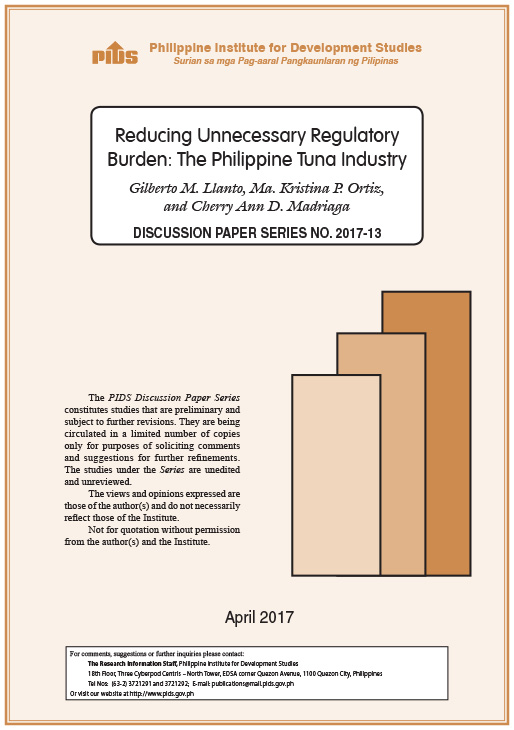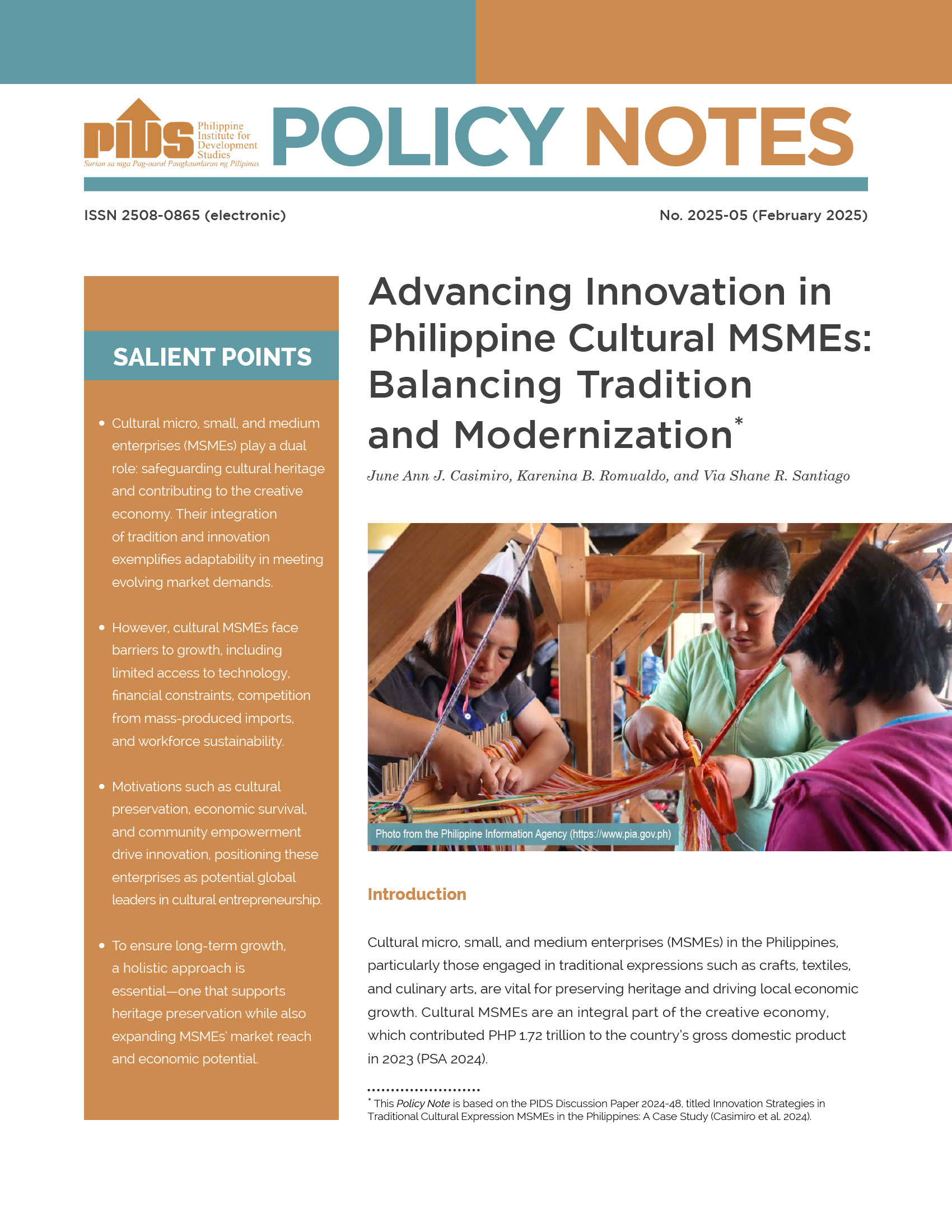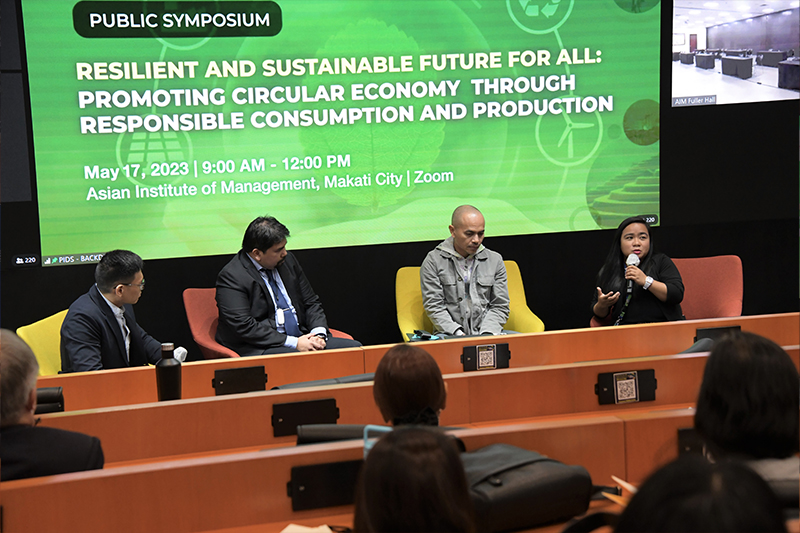
There is a need to reduce regulations in the tuna industry to make it efficient and competitive, according to researchers of state think tank Philippine Institute for Development Studies (PIDS).
The authors of “Reducing Unnecessary Regulatory Burden: The Philippine Tuna Industry”—PIDS President Gilberto Llanto, Research Analyst Maria Kristina Ortiz, and former Supervising Research Specialist Cherry Ann Madriaga—pointed out that the industry’s current regulatory framework is burdensome.
Fishing is one of the major industries in the Philippines’ agriculture, fisheries, and forestry sector. However, its contribution to the economy is still minimal—only 1.7 percent of the gross domestic product.
The authors mapped out the regulations imposed on the industry and identified those that are unnecessary and too burdensome for the key players. They also conducted interviews and focus group discussions with regulatory bodies such as the Bureau of Fisheries and Aquatic Resources (BFAR) and the Marine Industry Authority (MARINA) and with the local government of General Santos City, tuna industry associations, commercial tuna fishers, tuna exporters, tuna canners, and municipal fishermen.
In business registration alone, the study found a number of steps and requirements that need to be simplified to shorten the process. At present, tuna investors have to comply with the requirements and certifications set not just by their local government units (LGUs) but also by the different regulatory bodies. This makes the whole process costly and tedious especially for small fish operators.
The authors observed that “complying with the registration and licensing requirements was difficult for fishing vessels, especially since some of the regional offices of MARINA and BFAR may be not in the same city or municipality.” Moreover, “certain steps have to be undertaken in the BFAR Regional Offices, which means that actual processing time depends on the availability of inspectors.”
Meanwhile, when it comes to the processing stage, tuna companies also have to make sure they comply with the standards set by the BFAR and the Food and Drug Authority (FDA), such as the cooling/chilling temperature that must be applied throughout the handling process, the essential composition and quality factors, standards for food additives and contaminants, proper hygiene and handling practices, proper packaging and labelling practices, methods of sampling, examination and analysis of products, definition of defective products, and the requirements for lot acceptance.
The final stages of marketing and distribution are also no easy feat for companies as their exports need to undergo various laboratory tests depending on the requirements of the importing country.
The costly trainings to become a qualified person in industry regulatory affairs that are provided by the FDA are also posing challenges for industry players.
Aside from these pitfalls, the authors identified other reasons that made the enforcement of regulations inefficient, such as the inadequate staffing on the side of the regulator, lack of proper and effective communication and consultation mechanism between regulators and regulated entities, inadequate understanding and appreciation of regulatory intent, and inconsistent application of regulations.
They urged regulatory agencies to make use of technology to expedite their processes. MARINA and BFAR have established joint circulars for mobile registration and licensing. Providing incentives to LGUs that have taken steps to improve their regulatory system would also help, the authors added. ###
If you wish to know more about the study, download a copy of the discussion paper from the PIDS website.
The authors of “Reducing Unnecessary Regulatory Burden: The Philippine Tuna Industry”—PIDS President Gilberto Llanto, Research Analyst Maria Kristina Ortiz, and former Supervising Research Specialist Cherry Ann Madriaga—pointed out that the industry’s current regulatory framework is burdensome.
Fishing is one of the major industries in the Philippines’ agriculture, fisheries, and forestry sector. However, its contribution to the economy is still minimal—only 1.7 percent of the gross domestic product.
The authors mapped out the regulations imposed on the industry and identified those that are unnecessary and too burdensome for the key players. They also conducted interviews and focus group discussions with regulatory bodies such as the Bureau of Fisheries and Aquatic Resources (BFAR) and the Marine Industry Authority (MARINA) and with the local government of General Santos City, tuna industry associations, commercial tuna fishers, tuna exporters, tuna canners, and municipal fishermen.
In business registration alone, the study found a number of steps and requirements that need to be simplified to shorten the process. At present, tuna investors have to comply with the requirements and certifications set not just by their local government units (LGUs) but also by the different regulatory bodies. This makes the whole process costly and tedious especially for small fish operators.
The authors observed that “complying with the registration and licensing requirements was difficult for fishing vessels, especially since some of the regional offices of MARINA and BFAR may be not in the same city or municipality.” Moreover, “certain steps have to be undertaken in the BFAR Regional Offices, which means that actual processing time depends on the availability of inspectors.”
Meanwhile, when it comes to the processing stage, tuna companies also have to make sure they comply with the standards set by the BFAR and the Food and Drug Authority (FDA), such as the cooling/chilling temperature that must be applied throughout the handling process, the essential composition and quality factors, standards for food additives and contaminants, proper hygiene and handling practices, proper packaging and labelling practices, methods of sampling, examination and analysis of products, definition of defective products, and the requirements for lot acceptance.
The final stages of marketing and distribution are also no easy feat for companies as their exports need to undergo various laboratory tests depending on the requirements of the importing country.
The costly trainings to become a qualified person in industry regulatory affairs that are provided by the FDA are also posing challenges for industry players.
Aside from these pitfalls, the authors identified other reasons that made the enforcement of regulations inefficient, such as the inadequate staffing on the side of the regulator, lack of proper and effective communication and consultation mechanism between regulators and regulated entities, inadequate understanding and appreciation of regulatory intent, and inconsistent application of regulations.
They urged regulatory agencies to make use of technology to expedite their processes. MARINA and BFAR have established joint circulars for mobile registration and licensing. Providing incentives to LGUs that have taken steps to improve their regulatory system would also help, the authors added. ###
If you wish to know more about the study, download a copy of the discussion paper from the PIDS website.












